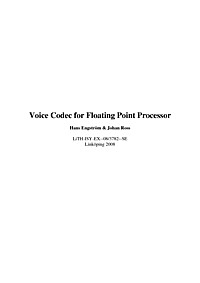
Voice Codec for Floating Point Processor
As part of an ongoing project at the department of electrical engineering, ISY, at Linköping University, a voice decoder using floating point formats has been the focus of this master thesis. Previous work has been done developing an mp3-decoder using the floating point formats. All is expected to be implemented on a single DSP.The ever present desire to make things smaller, more efficient and less power consuming are the main reasons for this master thesis regarding the use of a floating point format instead of the traditional integer format in a GSM codec. The idea with the low precision floating point format is to be able to reduce the size of the memory. This in turn reduces the size of the total chip area needed and also decreases the power consumption.One main question is if this can be done with the floating point format without losing too much sound quality of the speech. When using the integer format, one can represent every value in the range depending on how many bits are being used. When using a floating point format you can represent larger values using fewer bits compared to the integer format but you lose representation of some values and have to round the values off.From the tests that have been made with the decoder during this thesis, it has been found that the audible difference between the two formats is very small and can hardly be heard, if at all. The rounding seems to have very little effect on the quality of the sound and the implementation of the codec has succeeded in reproducing similar sound quality to the GSM standard decoder.


















